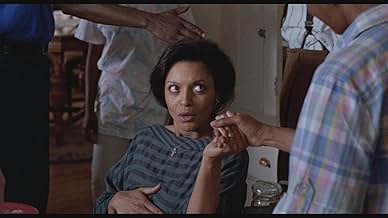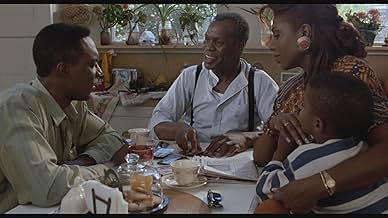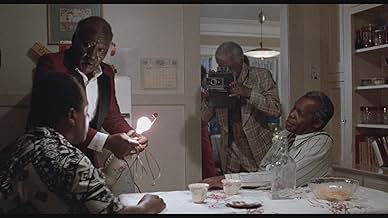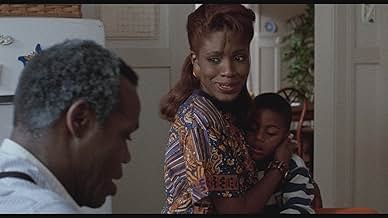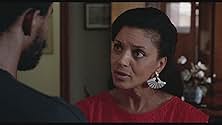CALIFICACIÓN DE IMDb
7.1/10
3.2 k
TU CALIFICACIÓN
Un viejo conocido carismático llega a la ciudad, lo que causa problemas a una familia apacible.Un viejo conocido carismático llega a la ciudad, lo que causa problemas a una familia apacible.Un viejo conocido carismático llega a la ciudad, lo que causa problemas a una familia apacible.
- Premios
- 7 premios ganados y 13 nominaciones en total
DeVaughn Nixon
- Sunny
- (as Devaughn Walter Nixon)
DeForest Covan
- Fred Jenkins
- (as DeForest Coven)
- Dirección
- Guionista
- Todo el elenco y el equipo
- Producción, taquilla y más en IMDbPro
Opiniones destacadas
Danny Glover shows up at the door of his old friends and moves in. Over the next few weeks, a lot of stuff happens.
Charles Burnett's movie seems to be a slice of life piece, showing the variety and contradictions of a small Black community, nominally in Los Angeles. There are tough guys and weak guys, but it's a solid working-class community where the choir sings polite gospel, and the preacher comes to visit the visit and chide them for using "old-fashioned" obeah cures instead of prayer.
This isn't the world of rap or youth, but of the older, settled community. In some ways it seems idyllic, with no drug dealers or gang violence, the standard modern cinematic image of Black communities. There's no rap music, but there is the blues and a small boy playing a trumpet very loudly.
It's warm and frequently silly, and beneath it is a had recognition of being unregarded. I found it very familiar, and if the older folks had been speaking Yiddish, i might have been, if not my own home growing up, then a cousin's, or that of one of my father's old friends.
Charles Burnett's movie seems to be a slice of life piece, showing the variety and contradictions of a small Black community, nominally in Los Angeles. There are tough guys and weak guys, but it's a solid working-class community where the choir sings polite gospel, and the preacher comes to visit the visit and chide them for using "old-fashioned" obeah cures instead of prayer.
This isn't the world of rap or youth, but of the older, settled community. In some ways it seems idyllic, with no drug dealers or gang violence, the standard modern cinematic image of Black communities. There's no rap music, but there is the blues and a small boy playing a trumpet very loudly.
It's warm and frequently silly, and beneath it is a had recognition of being unregarded. I found it very familiar, and if the older folks had been speaking Yiddish, i might have been, if not my own home growing up, then a cousin's, or that of one of my father's old friends.
. . . as I have ever seen on film. Danny Glover is an incredibly convincing devilish character - tossed into the midst of your average, striving African-American family. To see his interplay with the parents - who thought they had left their small town ways and superstitions behind - as well as with the two sons - an almost classical prodigal son story - was to witness what surely was one of the best movies of a great movie decade. This movie cemented my status as an ardent admirer of the work of Charles Burnett, surely the cream of the new crop of talented American directors. This is a very suspenseful film, one that will enlighten those with a desire to learn more about the Black experience in America.
What a strange, powerful, unsettling and unique film. If you want to experience the tingling of terror, than over the course of 97 minutes becomes more and more apparent, this might be the film for you. Some of it is more ambition than execution. Sometimes it tries to be a bit too profound, and some of the acting is a bit low key, but I have never seen anything like this in my life.
We first she him in the shape of an old friend. We hear a knock on the door and in comes Harry, the family friend who hasn't set a foot in the town for 30 years. He makes it clear that he was heading somewhere else, but needed a rest after a long bus ride. The old married couple invites him to stay, but our friend Harry never leave. He seems so friendly, but one on one he can make the most unsettling remarks that would crawl under the skin of anybody.
His past could very well be covered with blood, and his present surroundings starts to descend into hell. Danny Glover plays the magnetic and devilish persona, and this is certainly his magnum opus. Never seen such an enigmatic and bigger than life performance from him, and few could match it. Some become his disciples, others look at his with hate. It's built around, or perhaps within the mystique between old folklore, superstition and religion Some of it is slightly simple minded. And it's allusions to the devil and the battle between good and evil might seem a tad forced. But this is certainly one for the books.
We first she him in the shape of an old friend. We hear a knock on the door and in comes Harry, the family friend who hasn't set a foot in the town for 30 years. He makes it clear that he was heading somewhere else, but needed a rest after a long bus ride. The old married couple invites him to stay, but our friend Harry never leave. He seems so friendly, but one on one he can make the most unsettling remarks that would crawl under the skin of anybody.
His past could very well be covered with blood, and his present surroundings starts to descend into hell. Danny Glover plays the magnetic and devilish persona, and this is certainly his magnum opus. Never seen such an enigmatic and bigger than life performance from him, and few could match it. Some become his disciples, others look at his with hate. It's built around, or perhaps within the mystique between old folklore, superstition and religion Some of it is slightly simple minded. And it's allusions to the devil and the battle between good and evil might seem a tad forced. But this is certainly one for the books.
One good role for Danny Glover can erase the memory of several 'Lethal Weapon' and 'Predator' sequels, but it took a small, independently produced feature to bring the best out of one of Hollywood's hardest working actors. In this modest comedy Glover plays an enigmatic travelin' man named Harry, arriving unannounced at the home of some old friends and adding a subtle tension to the domestic friction already eroding three generations of family ties. But the trouble with Harry is less what he is than what he represents: the ghost of old traditions lurking in the cultural closet, and for a family already sensitive to portents and omens he might be the embodiment of all their superstitions. Writer director Charles Burnett keeps the viewer on guard with his elusive plot and complex characters, but the film is understated almost to a fault. The metaphors and hidden meanings (better suited to a stage play) help create a portentous mood, but in the end leave a lot unexplained.
Charles Burnett is the unsung vanguard of African-American cinema, who starts his career years before Spike Lee, yet whose output is far less prolific, TO SLEEP WITH ANGER is only his third feature, after KILLER OF SHEEP (1978) and MY BROTHER'S WEDDING (1983).
The life of South Los Angeles inhabitants Gideon and Suzie (Butler and Alice) starts to unravel when an old friend from the South, Harry (Glover) blows in one day, out of hospitality and bonhomie, they invite Harry to stay as long as he wishes. After backhanded remarks questioning the philanthropic work of Gideon and Suzie's elder son Junior (Lumbly) and his wife Pat (McGee), who is gravid with a baby number two, Harry finds his perfect target in Gideon and Suzie's younger son Samuel aka. Baby Brother (Brooks), whose immaturity, trivial grievance and maladaptive fatherhood gives the access of Harry's macho, wheedling male-bonding of going back to the South, which brings tension between Baby Brother and his family, especially with his wife Linda (Ralph), who is haplessly juggling between her career and traditional drudgery assigned to a wife, child-rearing and domestic chores.
Bad omen foreshadows Harry's arrival, the opening surreal self-combusted metaphor and the breaking of Gideon's charm all presage that it is a hostage to fortune to allow Harry overstaying his welcome. In Burnett's progressive thinking, there isn't much gray zone in the tradition versus urbanization tug-of-war, Harry, an incarnation of the vileness of a hidebound mindset (characterized by male chauvinism and superstition), is a menace with an elusive ulterior motive, and Danny Glover submerses deeply into Harry's dark side with a simian, hail-fellow-well-met expansiveness that is only betrayed by his piercing, menacing glint, shrouded in a mystical aura, he is mesmeric enough to hold our attention, but we have no idea what is he up to, because gradually Harry is reduced to a symbol, an unequivocal bad influence, which makes his comeuppance a bit blunt, if there is any redeeming feature in him, it is totally under our radar.
Above all, TO SLEEP WITH ANGER is an ensemble piece, great performances are actualized, barring the top-billing Glover, also by its distaff players: Mary Alice, who is not just a devoted wife, a capable ob-gyn doctor, but also a witty and sensible mother, and knows how to live up to be the pillar of the household when the crunch befalls; Sheryl Lee Ralph, whose suffering wife of a man-child is mostly poignant, and Ethel Ayler, who plays Hattie, an old acquaintance whose newborn faith projects a searing antagonism against Harry even before he reveals his true colors. Good impression is dwindled on the man's front, Paul Butler's Gideon is taken to his bed most of the time, Carl Lumbly is prone to be an empty vessel (by making the most noise) and Richard Brooks has the juiciest role, but is squandered by a script which portrays him as the good-for-nothing every has to condone with.
That said, TO SLEEP WITH ANGER deserves to be seen by a larger demography (it is a 4-times Independent Spirit winner if that doesn't mean nothing), for its steady deconstruction-and-reconstruction of familial bonds, for its unpretentious ethnic portrayal, and most prominently, for Burnett's unorthodox, pragmatic perspective on African-Americans' assimilation and adjustment in a modern society.
The life of South Los Angeles inhabitants Gideon and Suzie (Butler and Alice) starts to unravel when an old friend from the South, Harry (Glover) blows in one day, out of hospitality and bonhomie, they invite Harry to stay as long as he wishes. After backhanded remarks questioning the philanthropic work of Gideon and Suzie's elder son Junior (Lumbly) and his wife Pat (McGee), who is gravid with a baby number two, Harry finds his perfect target in Gideon and Suzie's younger son Samuel aka. Baby Brother (Brooks), whose immaturity, trivial grievance and maladaptive fatherhood gives the access of Harry's macho, wheedling male-bonding of going back to the South, which brings tension between Baby Brother and his family, especially with his wife Linda (Ralph), who is haplessly juggling between her career and traditional drudgery assigned to a wife, child-rearing and domestic chores.
Bad omen foreshadows Harry's arrival, the opening surreal self-combusted metaphor and the breaking of Gideon's charm all presage that it is a hostage to fortune to allow Harry overstaying his welcome. In Burnett's progressive thinking, there isn't much gray zone in the tradition versus urbanization tug-of-war, Harry, an incarnation of the vileness of a hidebound mindset (characterized by male chauvinism and superstition), is a menace with an elusive ulterior motive, and Danny Glover submerses deeply into Harry's dark side with a simian, hail-fellow-well-met expansiveness that is only betrayed by his piercing, menacing glint, shrouded in a mystical aura, he is mesmeric enough to hold our attention, but we have no idea what is he up to, because gradually Harry is reduced to a symbol, an unequivocal bad influence, which makes his comeuppance a bit blunt, if there is any redeeming feature in him, it is totally under our radar.
Above all, TO SLEEP WITH ANGER is an ensemble piece, great performances are actualized, barring the top-billing Glover, also by its distaff players: Mary Alice, who is not just a devoted wife, a capable ob-gyn doctor, but also a witty and sensible mother, and knows how to live up to be the pillar of the household when the crunch befalls; Sheryl Lee Ralph, whose suffering wife of a man-child is mostly poignant, and Ethel Ayler, who plays Hattie, an old acquaintance whose newborn faith projects a searing antagonism against Harry even before he reveals his true colors. Good impression is dwindled on the man's front, Paul Butler's Gideon is taken to his bed most of the time, Carl Lumbly is prone to be an empty vessel (by making the most noise) and Richard Brooks has the juiciest role, but is squandered by a script which portrays him as the good-for-nothing every has to condone with.
That said, TO SLEEP WITH ANGER deserves to be seen by a larger demography (it is a 4-times Independent Spirit winner if that doesn't mean nothing), for its steady deconstruction-and-reconstruction of familial bonds, for its unpretentious ethnic portrayal, and most prominently, for Burnett's unorthodox, pragmatic perspective on African-Americans' assimilation and adjustment in a modern society.
¿Sabías que…?
- TriviaIn 2017, the film was selected for preservation in the United States National Film Registry by the Library of Congress as being "culturally, historically, or aesthetically significant".
- Citas
Harry: Ya, but you can't do the shuffle with one leg. You and your wife, in fortunate. Now I'm not talking about you and what you do but some folks that always run to help the victim, deep down are attracted to pain and suffering and love to be near the dying.
Junior: All the people working with us are really doing it 'cause they hate to see suffering.
Harry: You never know what's in the heart and just because you can cry doesn't make you human.
- ConexionesReferenced in Siskel & Ebert & the Movies: Congo/The Glass Shield/Pocahontas/Fluke (1995)
- Bandas sonorasPrecious Memories
Traditional, attributed to J.B.F. Wright
Performed by Sister Rosetta Tharpe (as Sister Rosetta Thorpe)
Courtesy of SAVOY Records
Selecciones populares
Inicia sesión para calificar y agrega a la lista de videos para obtener recomendaciones personalizadas
- How long is To Sleep with Anger?Con tecnología de Alexa
Detalles
Taquilla
- Total en EE. UU. y Canadá
- USD 1,161,135
- Fin de semana de estreno en EE. UU. y Canadá
- USD 19,295
- 14 oct 1990
- Total a nivel mundial
- USD 1,161,135
- Tiempo de ejecución1 hora 42 minutos
- Color
- Mezcla de sonido
- Relación de aspecto
- 1.85 : 1
Contribuir a esta página
Sugiere una edición o agrega el contenido que falta

Principales brechas de datos
By what name was To Sleep with Anger (1990) officially released in India in English?
Responda

